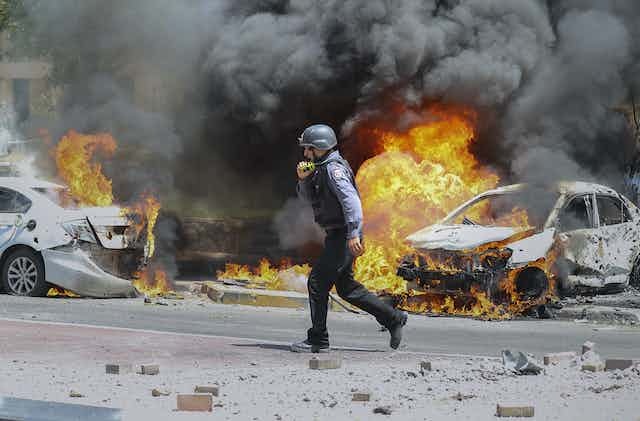Hamas assault initiates lethal Middle Eastern turmoil.

The recent assault by Hamas in southern Israel over the weekend was not only shocking and horrifying but also immensely impactful. It represented the deadliest attack in decades, involving thousands of rockets launched by militants and coordinated assaults from multiple fronts—land, sea, and air. What was particularly distressing was the deliberate targeting of civilians, including elderly women and young children, resulting in the hostage-taking of as many as 100 Israelis. As of the latest update, the death toll among Israelis had climbed to at least 600, with over 2,000 individuals sustaining injuries.
The exact method by which Hamas orchestrated this attack remains unclear. Nonetheless, the consequences have brought additional tragedy to Gaza. By Sunday afternoon, Israeli retaliatory measures had resulted in the deaths of 370 Palestinians and left over 2,000 wounded. The potential for a ground invasion grows more imminent. Benjamin Netanyahu, once seen as the epitome of “Mr. Security,” now speaks of a “long and challenging conflict” aimed at demolishing Hamas’ hiding spots. He urged Palestinians to “vacate those areas immediately,” fully aware that in this densely populated territory, there’s nowhere for them to seek shelter. As always, it is civilians who suffer the most from such actions.
This presents a significant oversight in military and security operations, especially considering Israel’s reputation for advanced surveillance technologies and extensive human intelligence networks. Not only was the assault unanticipated, but civilians in dire situations had to wait for the army’s arrival for hours. This echoes a well-known intelligence failure almost precisely 50 years ago during the Yom Kippur war. Inevitably, questions arise about the consequences of the political upheaval spurred by Mr. Netanyahu’s far-right government and its contentious “reform” of the judiciary.
However, the most notable failure here is not of intelligence or security but rather of politics. Less than a year ago, the UN Middle East envoy warned the Security Council that tensions were reaching a critical level. Last year saw the highest levels of violence in Israel, the West Bank, and Jerusalem since the end of the second intifada in 2005, raising widespread anticipation for a potential third intifada. Incursions by the Israel Defence Forces have surged, with this summer marking the largest operation in the West Bank in two decades.
For decades, Palestinians have faced occupation, the gradual disappearance of the possibility of establishing a viable future state due to settlements, and increased violence from settlers who feel emboldened by a sense of immunity. Gaza’s economy has been severely affected by the fifteen-year blockade, plunging half of its population into poverty. While there has been a recent slight economic improvement, it fails to address the political crisis exacerbated by a Palestinian leadership lacking both authority and legitimacy. Primarily, Mr. Netanyahu’s leadership has overseen extensive settlement expansions, the empowerment of radical nationalists and openly prejudiced individuals in significant roles, and the promise of annexation.
Just over a week ago, Jake Sullivan, President Biden’s national security adviser, claimed that “The Middle East region is quieter today than it has been in two decades.” The events of this weekend not only profoundly contradict that evaluation but also highlight the consequences of U.S. disengagement. There is a heightened risk of violence in the West Bank and the potential for a broader conflict involving Hezbollah in Lebanon. On Sunday morning, an Egyptian police officer fatally shot two Israeli tourists in Alexandria. Hamas has not only disrupted the progress toward normalizing relations between Saudi Arabia and Israel but has also, at a significant human cost, emphasized that agreements with Gulf states that sideline Palestinian concerns are not a viable solution. It’s clear that the status quo before Saturday was neither sustainable nor manageable.


